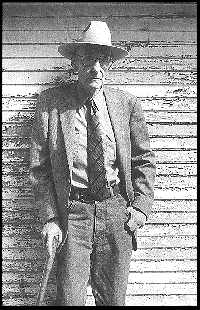

Writers work with words and voices just as painters work with colors; and where do these words and voices come from? Many sources: conversations heard and overheard, movies and radio broadcasts, newspapers, magazines, yes, and other writers;
a phrase comes into the mind from an old western story in a pulp magazine read years ago, can't remember where or when: "He looked at her, trying to read her mind -- but her eyes were old, unbluffed, unreadable." There's one that I lifted.
The County Clerk sequence in Naked Lunch derived from con- tact with the County Clerk in Cold Spring, Texas. It was in fact an elaboration of his monologue, which seemed merely boring at the time, since I didn't know yet that I was a writer. In any case, there wouldn't have been any County Clerk if I had been sitting on my ass waiting for my "very own words."
You've all met the ad man who is going to get out of the rat race, shut himself up in a cabin, and write the Great American Novel. I always tell him, "Don't cut your input, B.J. -- you might need it."
So many times I have been stuck on a story line, can't see where it will go from here; then someone drops around and tells me about fruit- eating fish in Brazil. I got a whole chapter out of that. Or I buy a book to read on the plane, and there is the answer; and there's a nice phrase too, "sweetly inhuman voices." I had a dream about such voices before I read The Big Jump by Leigh Brackett, and found that phrase.
Look at the surrealist moustache on the Mona Lisa. Just a silly joke? Consider where this joke can lead. I had been working with Malcolm McNeill for five years on an illustrated book entitled Ah Pook Is Here, and we used the same idea: Hieronymus Bosch as the background for scenes and characters taken from the Mayan codices and transformed into modern counterparts. That face in the Mayan Dresden Codex will be the barmaid in this scene, and we can use the Vulture God over here. Bosch, Michaelangelo, Renoir, Monet, Picasso -- steal anything in sight. You want a certain light on your scene? Lift it from Monet. You want a 1930s backdrop? Use Hopper.
The same applies to writing. Joseph Conrad did some superb descriptive passages on jungles, water, weather; why not use them verbatim as background in a novel set in the tropics? Continuity by so-and-so, description and background footage from Conrad. And of course you can kidnap someone else's characters and put them in a different set. The whole gamut of painting, writing, music, film, is yours to use. Take Molly Bloom's soliloquy and give it to your heroine. It happens all the time anyway; how many times have we had Romeo and Juliet served up to us, and Camille grossed forty million in The Young Lovers. So let's come out in the open with it and steal freely.
My first application of this principle was in Naked Lunch. The interview between Carl Peterson and Doctor Benway is modelled on the interview between Razumov and Councillor Mikulin in Conrad's Under Western Eyes. To be sure, there is no resemblance between Benway and Mikulin, but the form of the inter- view, Mikulin's trick of unfinished sentences, his elliptical approach, and the conclusion of the interview are quite definitely and consciously used. I did not at the time see the full implications.
Brion Gysin carried the technique further in an unpublished scene from his novel The Process. He took a section of dialogue verbatim from a science fiction novel and used it in a similar scene. (The science fiction novel, appropriately, concerned a mad scientist who devised a black hole into which he disappeared.) I was, I confess, slightly shocked by such overt and traceable plagiarism. I had not quite abandoned the fetish of originality, though of course the whole sublime concept of total theft is implicit in cut-ups and montage.
You see, I had been conditioned to the idea of words as property -- one's "very own words" -- and consequently to a deep repugnance for the black sin of plagiarism. Originality was the great virtue. I recall a boy who was caught out copying an essay from a magazine article, and this horrible case discussed in whispers... for the first time the dark word "plagiarism" impinged on my consciousness. Why, in a Jack London story a writer shoots himself when he finds out that he has, without knowing it, plagiarized another writer's work. He did not have the courage to be a writer. Fortunately, I was made of sterner or at least more adjustable stuff.
Brion pointed out to me that I had been stealing for years: "Where did that come from -- 'Eyes old, unbluffed, unreadable'? And that -- 'inflexible authority'? And that - 'arty type, no principles.' And that - and that - and that?" He looked at me sternly.
"Vous etes un voleur honteux... a closet thief." So we drew up a manifesto...
-William S. Burroughs
(taken from The Adding Machine)